高三复习 定语从句详解
高三定语从句重难点解析
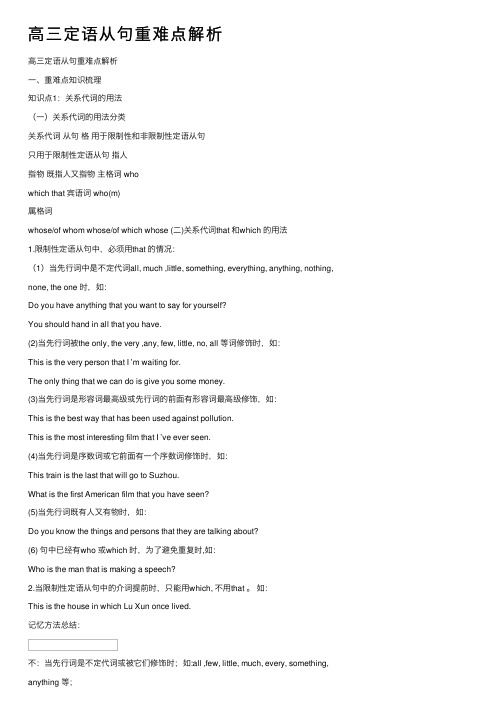
⾼三定语从句重难点解析⾼三定语从句重难点解析⼀、重难点知识梳理知识点1:关系代词的⽤法(⼀)关系代词的⽤法分类关系代词从句格⽤于限制性和⾮限制性定语从句只⽤于限制性定语从句指⼈指物既指⼈⼜指物主格词 whowhich that 宾语词 who(m)属格词whose/of whom whose/of which whose (⼆)关系代词that 和which 的⽤法1.限制性定语从句中,必须⽤that 的情况:(1)当先⾏词中是不定代词all, much ,little, something, everything, anything, nothing, none, the one 时,如:Do you have anything that you want to say for yourself?You should hand in all that you have.(2)当先⾏词被the only, the very ,any, few, little, no, all 等词修饰时,如:This is the very person that I ’m waiting for.The only thing that we can do is give you some money.(3)当先⾏词是形容词最⾼级或先⾏词的前⾯有形容词最⾼级修饰,如:This is the best way that has been used against pollution.This is the most interesting film that I ’ve ever seen.(4)当先⾏词是序数词或它前⾯有⼀个序数词修饰时,如:This train is the last that will go to Suzhou.What is the first American film that you have seen?(5)当先⾏词既有⼈⼜有物时,如:Do you know the things and persons that they are talking about?(6) 句中已经有who 或which 时,为了避免重复时,如:Who is the man that is making a speech?2.当限制性定语从句中的介词提前时,只能⽤which, 不⽤that 。
高中英语:定语从句专项讲解
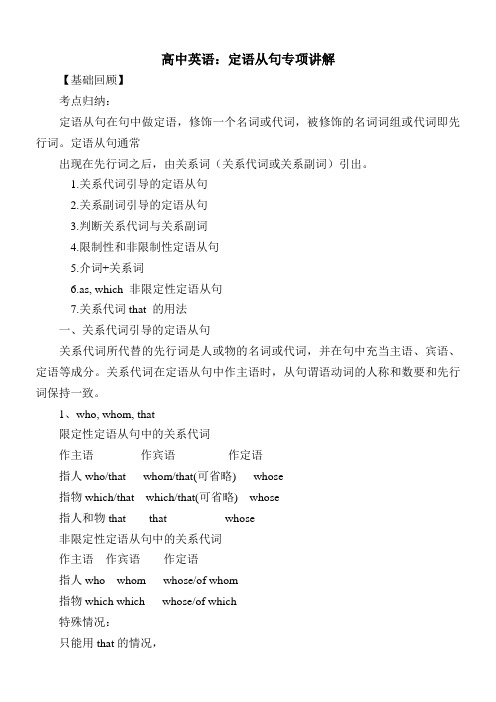
高中英语:定语从句专项讲解【基础回顾】考点归纳:定语从句在句中做定语,修饰一个名词或代词,被修饰的名词词组或代词即先行词。
定语从句通常出现在先行词之后,由关系词(关系代词或关系副词)引出。
1.关系代词引导的定语从句2.关系副词引导的定语从句3.判断关系代词与关系副词4.限制性和非限制性定语从句5.介词+关系词6.as, which 非限定性定语从句7.关系代词that 的用法一、关系代词引导的定语从句关系代词所代替的先行词是人或物的名词或代词,并在句中充当主语、宾语、定语等成分。
关系代词在定语从句中作主语时,从句谓语动词的人称和数要和先行词保持一致。
1、who, whom, that限定性定语从句中的关系代词作主语作宾语作定语指人who/that whom/that(可省略) whose指物which/that which/that(可省略) whose指人和物that that whose非限定性定语从句中的关系代词作主语作宾语作定语指人who whom whose/of whom指物which which whose/of which特殊情况:只能用that的情况,先行词为everything,all,little,much等不定代词时;先行词被all,every,no,any,some,little,much,one修饰时;先行词被the only,the very,the same,the last修饰时;先行词被序数词或形容词最高级修饰时;先行词是be的表语或there be 的主语时;先行词有人又有物时;当主句是以who或which开头的特殊疑问句时。
不能用that的情况介词前置时;非限定性定语从句中先行词本身是that多用who,不用that的情况。
先行词为anyone,one,ones时;先行词为those,he和people时;这些词代替指人,whom在定语从句中指人,"who"和“that”既可作主语又可作宾语(作宾语可以省略,who作宾语变为whom),that可以指人也可以指物, who不可指物。
(完整版)定语从句讲解

1一、定语从句概述定语可以由形容词、名词、代词、数词、分词、副词、不定式以及介词短语 等来担任,也可以由一个句子来担任。
在句子中起定语作用的从句称为定语 从句。
定语从句在句中的作用相当于形容词,故又称为形容词性从句。
被定 语从句修饰的名词叫先行词,引导定语从句的词叫关系词。
二 关系词的用法。
关系词可分为关系代词和关系副词。
关系词指代先行词,放在先行词与 定语从句之间起连接作用,同时又充当定语从句中的某一种成分(主语、宾 语、状语等)。
引导定语从句的关系代词有"at ,who ,whom ,whose ,which;关系副词有 when ,where ,why 等。
关系词在句子中的指代作用及成分如下表 1.关系代词的用法(1) who, whom 的用法二者都用于指人。
who 在定语从句中作主语、宾语;whom 在定语从句中 作宾语。
在现代英语里,有时who 也可代替whom 在从句中作宾语。
作 宾语的关系代词who ,whom 可以省略(介词后作宾语的关系代词除外)。
She was the one who did most of the talking 。
大部分时间都是她在说话。
(作主语) The boy who I know studies best in his class.我认识的那个男孩在班上学习最好。
(作宾语)I happened to meet the professor (who/whom) I got to know at a party. 我碰巧遇见了那位在一次聚会上认识的教授。
(作宾语,whom 可用who 代替) whom 在从句中作介词的宾语,且介词提到whom 前面时,不能用who 代替。
Yesterday I came across a few friends with whom I went to the park .昨天 我碰见了几个朋友,我和他们一起去了公园。
高中定语从句详细讲解
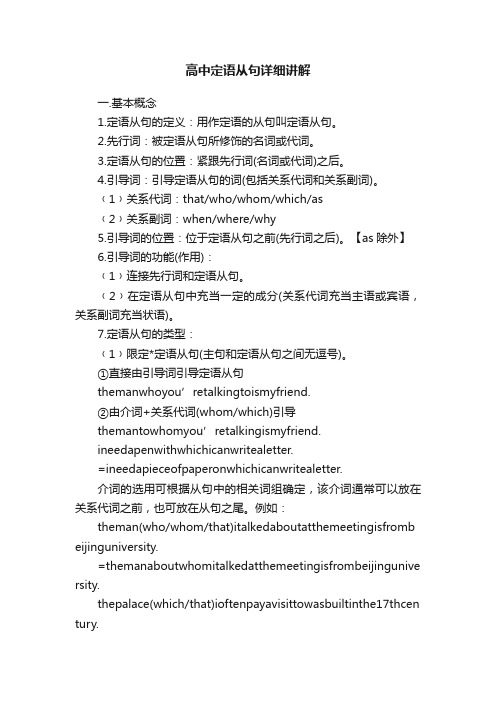
高中定语从句详细讲解一.基本概念1.定语从句的定义:用作定语的从句叫定语从句。
2.先行词:被定语从句所修饰的名词或代词。
3.定语从句的位置:紧跟先行词(名词或代词)之后。
4.引导词:引导定语从句的词(包括关系代词和关系副词)。
﹙1﹚关系代词:that/who/whom/which/as﹙2﹚关系副词:when/where/why5.引导词的位置:位于定语从句之前(先行词之后)。
【as除外】6.引导词的功能(作用):﹙1﹚连接先行词和定语从句。
﹙2﹚在定语从句中充当一定的成分(关系代词充当主语或宾语,关系副词充当状语)。
7.定语从句的类型:﹙1﹚限定*定语从句(主句和定语从句之间无逗号)。
①直接由引导词引导定语从句themanwhoyou’retalkingtoismyfriend.②由介词+关系代词(whom/which)引导themantowhomyou’retalkingismyfriend.ineedapenwithwhichicanwritealetter.=ineedapieceofpaperonwhichicanwritealetter.介词的选用可根据从句中的相关词组确定,该介词通常可以放在关系代词之前,也可放在从句之尾。
例如:theman(who/whom/that)italkedaboutatthemeetingisfromb eijinguniversity.=themanaboutwhomitalkedatthemeetingisfrombeijingunive rsity.thepalace(which/that)ioftenpayavisittowasbuiltinthe17thcen tury.=thepalacetowhichioftenpayavisitwasbuiltinthe17thcentury.﹙2﹚非限定*定语从句(主句和定语从句之间用逗号隔开)。
①直接由引导词引导定语从句。
高中定语从句全面详细讲解
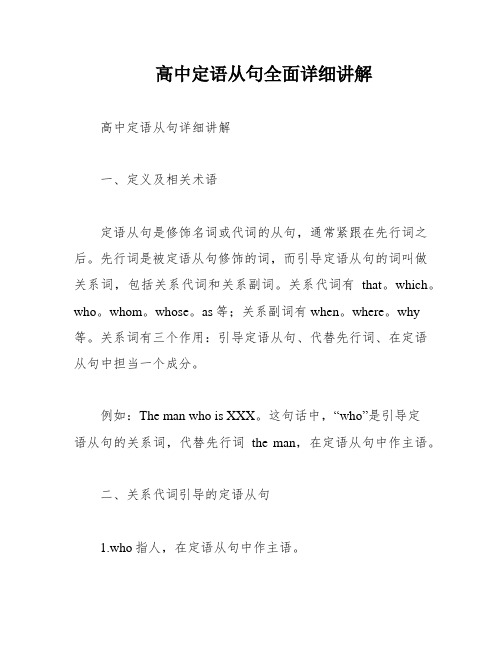
高中定语从句全面详细讲解高中定语从句详细讲解一、定义及相关术语定语从句是修饰名词或代词的从句,通常紧跟在先行词之后。
先行词是被定语从句修饰的词,而引导定语从句的词叫做关系词,包括关系代词和关系副词。
关系代词有that。
which。
who。
whom。
whose。
as等;关系副词有when。
where。
why 等。
关系词有三个作用:引导定语从句、代替先行词、在定语从句中担当一个成分。
例如:The man who is XXX。
这句话中,“who”是引导定语从句的关系词,代替先行词the man,在定语从句中作主语。
二、关系代词引导的定语从句1.who指人,在定语从句中作主语。
例如:XXX are from Class One。
正在踢足球的男孩是一班的。
Those who want to go to the museum must be at the school gate at 7 XXX。
想去博物馆的人必须在明晨7点到大门口集合。
XXX I helped an old man who had lost his way。
昨天我帮助了一位迷路的老人。
That is the XXX。
那就是教我们物理的老师。
2.whom指人,在定语从句中做宾语,常可省略。
例如:Mr。
Liu is the person (whom) you talked about on the bus。
XXX就是你们在公共汽车上谈论的那个人。
Li Ming is just the boy (whom) I want to see。
XXX正是我想要见的男孩。
The professor (whom) you are waiting for has come。
你正在等的教授已经来了。
The girl who is often praised by the teacher is our monitor。
She is a responsible and diligent student who always sets a good example for the rest of the class.The man you just met is my old friend。
(完整版)定语从句语法详解

定语从句语法专题(Attributive Clauses)教案一. 定语从句的概述:1.定语从句:在复合句中,修饰某一名词或代词的从句叫定语从句。
在句中做定语,被修饰的名词或代词,叫做先行词。
从句通常放在先行词之后,由关系词(关系代词或关系副词)引导。
其作用是作定语修饰主句的某个名词性成分,相当于形容词,所以又称为形容词性从句,一般紧跟在它所修饰的先行词后面。
eg She is the girl(who got the first prize.)girl先行词who充当从句主语, 从句做定语修饰girlThis is the boy who broke the window.这就是打破窗子的孩子。
the boy是先行词, who broke the window是限制性定语从句, 明确指出theboy是打破窗子的那个孩子,who 在从句中充当主语That is the house where he lived ten years ago.He is the man who/that lives next door.He is the man who I want to see.先行词关系词定语从句复合句: 是由一个主句和一个或一个以上的从句构成的句子, 复合句中的主句和从句都具有完整的的主语和谓语, 主句是复合句的主体, 可以独立存在, 从句需要有一个连词引导, 是修饰说明主句的, 不能独立存在, 根据在句中的不同作用, 从句可以分为三类: 定语从句, 名词性从句, 状语从句。
二. 引导定语从句的关系词有两大类:1.关系词:引导定语从句的关联词称为关系词,关系词有关系代词和关系副词。
关系代词: that, who, whom, whose, which, as(主, 宾, 定)关系副词: when, where, why.(状语)2.关系词的作用:(1)引导定语从句, 在先行词和定语从句之间起连接作用;(2)代替先行词在句中充当成分。
高中定语从句详解

定语从句讲解定语从句及相关术语1.定语从句:定语从句是由关系代词或关系副词引导的从句,其作用是作定语修饰主句的某个名词性成分,相当于形容词,所以又称为形容词性从句,一般紧跟在它所修饰的先行词后面。
2.关系词:引导定语从句的关联词称为关系词,关系词有关系代词和关系副词。
关系代词有that, which, who, whom, whose, as等;关系副词有where, when, why等。
关系词常有3个作用:1,引导定语从句。
2,代替先行词。
3,在定语从句中担当一个成分。
注:关系代词有主语.宾语之分。
一般whom作为宾语3.定语:定语用来限定、修饰名词或代词的,是对名词或代词起修饰、限定作用的词、短语或句子,汉语中常用………的‟表示。
主要由形容词担任。
此外,名词,代词,数词,分词,副词,不定式以及介词短语也可以来担任,也可以由一个句子来担任.单词作定语时通常放在它所修饰的词之前,作前置定语。
短语和从句作定语时则放在所修饰的词之后,作后置定语。
(一)限定性定语从句一、关系代词(在句中作主语、宾语或定语)1. that既可代表事物也可代表人,which代表事物;它们在从句中作主语或宾语,that在从句中作宾语时常可省略关系词,which在从句中作宾语也可以省略。
[eg:this is the book (which)you want。
]而且,如果which在从句中作“不及物动词+介词”的介词的宾语,注意介词不要丢掉,而且介词总是放在关系代词which的前边,但有的则放在它原来的位置限制性定语从句只能用that的几种情况1.当先行词是anything, everything, nothing (something 除外), few, all, none, little, some等代词时,或者是由every, any, all, some, no, little, few, much,each等修饰时(1) Have you taken down everything that Mr. Li has said?(3) All that can be done has been done(2) There seems to be nothing that seems impossible for him in the world.(4) There is little that I can do for you.注意1:部分时候that可以省略,如部分例句将that用括号括住。
高中定语从句详细讲解

高中定语从句详细讲解一、什么是定语从句?定语从句是修饰名词或代词的从句,用来对名词或代词进行进一步的说明或限制。
它通常由关系代词或关系副词引导。
二、关系代词引导的定语从句1. 引导关系代词有:that, which, who, whom, whose, as, when, where等。
例句1:The book that I borrowed from the library is very interesting.这本书是我从图书馆借来的,非常有趣。
例句2:The girl who is sitting next to me is my best friend.坐在我旁边的那个女孩是我最好的朋友。
例句3:I don't know the reason why he didn't come to the party.我不知道他为什么没来参加派对的原因。
三、关系副词引导的定语从句1. 引导关系副词有:when, where, why, how等。
例句4:This is the school where I studied last year.这是我去年学习的学校。
例句5:I will never forget the day when we met for the first time.我永远不会忘记我们第一次见面的那一天。
四、关系代词和关系副词的用法区别1. 关系代词在定语从句中充当主语或宾语,而关系副词则在定语从句中充当状语。
例句6:The girl who/that is standing there is my sister.(关系代词作主语)站在那里的那个女孩是我的妹妹。
例句7:I still remember the day when/that we went on a trip together.(关系副词作状语)我仍然记得我们一起去旅行的那一天。
五、关系代词的省略1. 当定语从句的关系代词在从句中作宾语,并且在主句中有明确的宾语时,可以省略关系代词。
高中英语2024届高考语法复习定语从句知识讲解(共十一个方面)
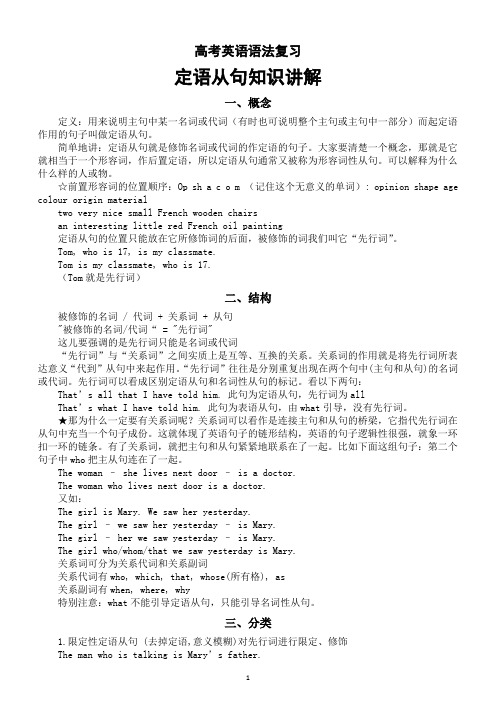
高考英语语法复习定语从句知识讲解一、概念定义:用来说明主句中某一名词或代词(有时也可说明整个主句或主句中一部分)而起定语作用的句子叫做定语从句。
简单地讲:定语从句就是修饰名词或代词的作定语的句子。
大家要清楚一个概念,那就是它就相当于一个形容词,作后置定语,所以定语从句通常又被称为形容词性从句。
可以解释为什么什么样的人或物。
☆前置形容词的位置顺序:Op sh a c o m (记住这个无意义的单词): opinion shape age colour origin materialtwo very nice small French wooden chairsan interesting little red French oil painting定语从句的位置只能放在它所修饰词的后面,被修饰的词我们叫它“先行词”。
Tom, who is 17, is my classmate.Tom is my classmate, who is 17.(Tom就是先行词)二、结构被修饰的名词 / 代词 + 关系词 + 从句"被修饰的名词/代词“ = "先行词"这儿要强调的是先行词只能是名词或代词“先行词”与“关系词”之间实质上是互等、互换的关系。
关系词的作用就是将先行词所表达意义“代到”从句中来起作用。
“先行词”往往是分别重复出现在两个句中(主句和从句)的名词或代词。
先行词可以看成区别定语从句和名词性从句的标记。
看以下两句:That’s all that I have told him. 此句为定语从句,先行词为allThat’s what I have told him. 此句为表语从句,由what引导,没有先行词。
★那为什么一定要有关系词呢?关系词可以看作是连接主句和从句的桥梁,它指代先行词在从句中充当一个句子成份。
这就体现了英语句子的链形结构,英语的句子逻辑性很强,就象一环扣一环的链条。
高考定语从句讲解

定语从句一、定义:在复合句中修饰名词或代词的从句。
二、结构:主句(含名词或代词)+关系词+……先行词修饰三、作用:连接作用、成分作用、替代作用四、关系代词:that,which,who,whom,whose,as在从句中充当主语、表语、宾语、定语。
1、that即可指人也可指物。
在定语从句中作主语、表语、宾语,且作表语、宾语时可省略。
以下情况常用that引导:(1)当先行词是everything,nothing,something,anything等不定代词时Is there anything(that)you don’t know?Do you have anything(that)you want to say for yourself?(2)当先行词被all,every,any,little,much,few,some,none,no,only等限定词修饰时I want to read all the books that were written by Lu Xun.You can take any seat that is free.(3)当先行词被序数词及形容词最高级修饰时This is the second book(that)I borrowed from the library.This is the most interesting film(that)I’ve ever seen.(4)当先行词中即有人也有物时The passengers and parcels that filled the car were mixed.Do you know the things and persons(that)they are talking about?(5)当先行词被the only,the very,the last,the same,the right,just修饰时He is the only person(that)I know here.This is the very bus(that)I am waiting for.The only thing(that)we can do is to give you some money.(6)当主句是以who,what,which开头的特殊疑问句时Who is the girl that is wearing a red coat?Which is the bike(that)you lost?(7)有两个定语从句时,其中一个关系代词宜用which,另外一个宜用that They built up a factory,which produced things that could cause pollution.(8)当先行词在主句中作表语,而关系代词在从句中也作表语Shanghai is no longer the city that it used to be.My Uncle is quite worn out from years of hard work.He is no longer the man that he was15years ago.(9)主句是there be句型且关系代词在从句中作主语时There is a seat in the corner that is still available.2、which指物。
高考定语从句知识讲解

定语从句一. 复合句定义复合句又称主从复合句,有一个主句和一个或一个以上的从句构成。
主句为句子的主体,从句不能独立,只用作句子的一个成分,如主语,表语,宾语,介词宾语,定语,同位语,状语等。
从句担任的是哪个句子成分,这个从句就叫做该成分的从句。
如主语从句,表语从句,宾语从句等。
二. 定语从句定义在句子中起到定语的作用,修饰句中的名词或代词的从句称为定语从句。
被修饰的名词或代词被称为先行词。
定语从句一般位于先行词的后面。
定语从句由关系代词或关系副词引导。
当关系代词作定语从句的主语时,其后的谓语动词的人称和数取决于先行词的人称和数。
关系代(副)词是定语从句的连接枢纽,在定语从句中起了三层作用:①引导定语从句,②替代先行词,③在从句中作成分。
关系代词代替先行词在从句中作主语、宾语等;关系副词代替先行词在定语从句中作状语。
关系词代替先行词在定语从句中作什么成分是判断该用关系代词还是关系副词的依据。
因此把先行词正确还原到定语从句中是做定语从句题很重要的一个技巧。
三. 关系代词引导的定语从句先行词是人或事物的名词或代词;并在句中作主语,宾语,表语,定语。
eg. The man who is shaking hands with my father is a policeman.和我父亲握手的那个人是警察。
eg. That is the man who teaches us English.那位就是叫我们英语的老师。
eg. Those who wish to go to the museum must be at the gate by 7:00 a.m.想去博物馆的人必须早上七点到大门口集合。
eg. Mr. Smith (whom) you met yesterday is a friend of mine.你昨天遇见的那位史密斯先生是我的一位朋友。
eg. The singer (whom) you wish to see has come.你想见的那位歌手已经来了。
高中英语语法定语从句总结全
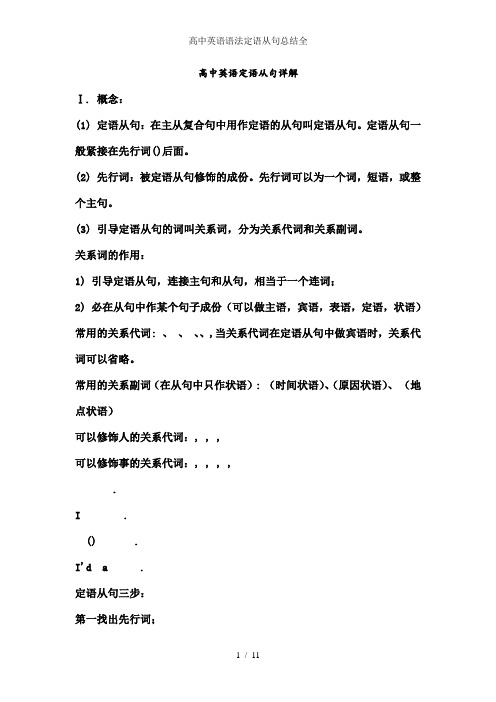
高中英语定语从句详解Ⅰ. 概念:(1) 定语从句:在主从复合句中用作定语的从句叫定语从句。
定语从句一般紧接在先行词()后面。
(2) 先行词:被定语从句修饰的成份。
先行词可以为一个词,短语,或整个主句。
(3) 引导定语从句的词叫关系词,分为关系代词和关系副词。
关系词的作用:1) 引导定语从句,连接主句和从句,相当于一个连词;2) 必在从句中作某个句子成份(可以做主语,宾语,表语,定语,状语)常用的关系代词: 、、、、,当关系代词在定语从句中做宾语时,关系代词可以省略。
常用的关系副词(在从句中只作状语): (时间状语)、(原因状语)、(地点状语)可以修饰人的关系代词:, , ,可以修饰事的关系代词:, , , ,.I .() .I'd a .定语从句三步:第一找出先行词;第二看先行词在定语从句中的语法功能(做主语、宾语、表语或状语);第三选择合适的关系词。
Ⅱ. 几个关系代词的基本用法:●: 可指人或物;在定语从句中作主语,宾语,表语。
(指人时,相当于或;指物时,相当于)(一般不用于非限制性定语从句; 不可置于介词后作宾语) 如:1. A . (主语)2.3. ( ) . (宾语)4. ()5. ( ) .6. 's ( ) .(表语)7. () .(= .= 。
= .)●: 指物;在定语从句中作主语,宾语。
如:1. .(主语)2. () I .(宾语)●, , :: 主格, 在从句中作主语,只可指人: 宾格,在从句中只能作宾语; 只可指人: 表所属关系,在从句中作定语。
译为:某人的,某物的+ 名词 + n. + (某物的)+ n. + (某人的)I . (主语)( / ) .I a .( = )A .(指人)( = )I'd a . (指物)( )关系代词作介词宾语 (在定语从句中,介词提前时,介词后:表人用;表物用 )关系代词在定语从句中用作介词宾语时, 介词可放于从句之首, 也可放于从句之末. 但以放于句首较为正式.(介词前置,必须注意不影响动词词组的含义。
高考英语定语从句详细解析
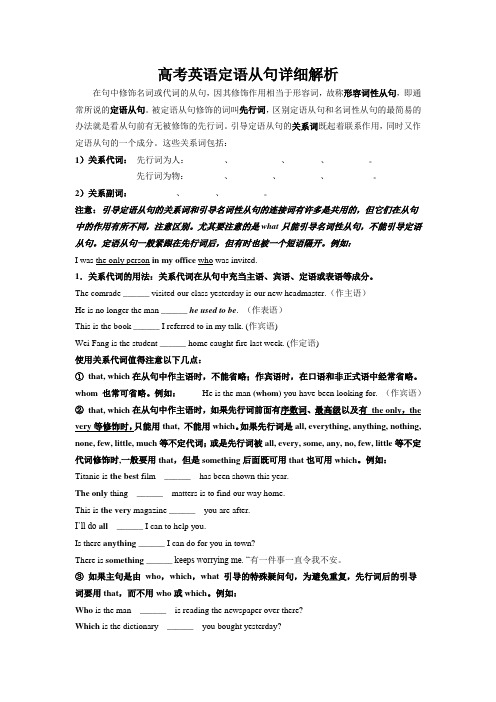
高考英语定语从句详细解析在句中修饰名词或代词的从句,因其修饰作用相当于形容词,故称形容词性从句,即通常所说的定语从句。
被定语从句修饰的词叫先行词,区别定语从句和名词性从句的最简易的办法就是看从句前有无被修饰的先行词。
引导定语从句的关系词既起着联系作用,同时又作定语从句的一个成分。
这些关系词包括:1)关系代词:先行词为人:________、_________ 、_______、________。
先行词为物:________、________、________、________ 。
2)关系副词:_________ 、_______、________。
注意:引导定语从句的关系词和引导名词性从句的连接词有许多是共用的,但它们在从句中的作用有所不同,注意区别。
尤其要注意的是what只能引导名词性从句,不能引导定语从句。
定语从句一般紧跟在先行词后,但有时也被一个短语隔开。
例如:I was the only person in my office who was invited.1.关系代词的用法:关系代词在从句中充当主语、宾语、定语或表语等成分。
The comrade ______ visited our class yesterday is our new headmaster.(作主语)He is no longer the man ______ he used to be. (作表语)This is the book ______ I referred to in my talk. (作宾语)Wei Fang is the student ______ home caught fire last week. (作定语)使用关系代词值得注意以下几点:①that, which在从句中作主语时,不能省略;作宾语时,在口语和非正式语中经常省略。
whom 也常可省略。
例如:He is the man (whom) you have been looking for. (作宾语)②that, which在从句中作主语时,如果先行词前面有序数词、最高级以及有the only,the very等修饰时,只能用that, 不能用which。
高中英语定语从句详解与复习

高中英语定语从句详解与复习定语从句即指在主从复合句用作定语的从句。
定语从句通常修饰名词或代词,对它进行限制、描绘和说明。
受定语从句修饰的词语叫先行词,引导定语从句的词语叫关系词。
关系词按其性质又分关系代词和关系副词。
根据从句与主句关系的紧密程度,定语从句又分为限制性定语从句和非限制性定语从句。
一、关系词的用法关系词根据其性质可分为关系代词和关系副词。
关系代词主要有 that, who, whom, whose, which, as 等,其中 who 和 whom 只用于指人,which和 as 只用于指事物,whose 和 that 既可于指人也可用于指物,它们在定语从句可用作主语、宾语、表语或定语;关系副词主要有 when, where 和 why,其中 when 表示时间,where 表地点,why 表原因,它们在定语从句中均用作状语。
如:This is the book (which) you want. 这就是你要的那本书。
There are a lot of things that are wrong. 有很多错的东西。
This is the town where I was born. 这就是我出生的城市。
These are the reasons why we do it. 这些就是我们这样做的原因。
二、关系词的选择一看先行词的意义,即分清先行词是指人、指物、时间、地点还是原因,如指物时不能用who或whom,指人时通常不用which等。
二看关系词的句法功能,即分清关系词是担任什么句子成分,是作主语还是宾语、是作定语还是状语等,如作定语通常用whose,有时也用which;作状语要用when, where, why。
注意,不要一看到先行词为表时间、地点、原因的名词,就认为一定要用 when, where, why 来引导定语从句,要注意分清它们在定语从句充当什么成分。
如:I forget the time when he will come. 我忘记了他来的时间。
高考英语 定语从句知识点归纳讲解(课件)

试卷讲评课件
▲ as通常以the same … as或such … as的形式引导定语从句,as在定 语从句中作主语、宾语或表语等。 as和which引导非限制性定语从句中都能指代整句内容,which译为“这”, as 译为“正如”。但定语从句位于句首时只能用as。As we all know,…/As is known to all,…(正如大家所知道….)
二、定语从句的关系词用法
试卷讲评课件
(一)关系代词:who、whom、which、that、whose、as
关系代词 who whom whose which that as
先行词 人 人
人/物 物
人/物 人/物
在从句中充当的成分 主语、宾语、表语
宾语 定语 主语、宾语 主语、宾语、表语 主语、宾语、表语
三、非限制性定语从句
试卷讲评课件
非限定性定语从句,从句式上看,有逗号隔开。它既可以修饰先行词, 也可修饰整个句子。它对其先行词没有限定、修饰的作用,只起补充、 说明的作用。 1.非限制性定语从句通常不能用that 2. 非限制性定语从句不能用why引导,要用for which代替why。例如: I had told them the reason,for which I didn't attend the meeting. 3. 非限制性定语从句置于句首时,不能用which引导。关系代词as引导 非限制性定语从句位置比较灵活,可以放主句前,也可以放主句后。
Tranquil/ˈtræŋkwəl/
试卷讲评课件
Li Shangyin(李商隐) 1.Li Shangyin was a Chinese poet of the late Tang Dynasty and born in Henei. 2.Li Shangyin was a typical late Tang poet. His works are sensuous, dense and allusive. 3.His most famous and cryptic poem is called Jin Se. sensuous/ˈsenʃuəs/ , dense/dens/ and allusive/əˈluːʒən/ .敏感、晦涩、含 沙射影。 Shangguan Wan'er(上官婉儿) 1. Shangguan Wan'er was a talented woman in Tang dynasty.
高中英语语法基础 ——定语从句知识点总结归纳讲解(附同步练习)(有答案)
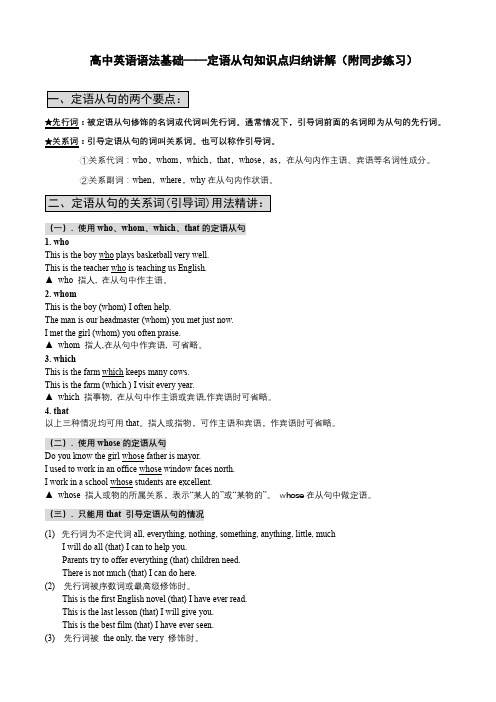
高中英语语法基础——定语从句知识点归纳讲解(附同步练习)★先行词:被定语从句修饰的名词或代词叫先行词。
通常情况下,引导词前面的名词即为从句的先行词。
★关系词:引导定语从句的词叫关系词。
也可以称作引导词。
①关系代词:who,whom,which,that,whose,as,在从句内作主语、宾语等名词性成分。
②关系副词:when,where,why在从句内作状语。
(一). 使用who、whom、which、that的定语从句1. whoThis is the boy who plays basketball very well.This is the teacher who is teaching us English.▲who 指人, 在从句中作主语。
2. whomThis is the boy (whom) I often help.The man is our headmaster (whom) you met just now.I met the girl (whom) you often praise.▲whom 指人,在从句中作宾语, 可省略。
3. whichThis is the farm which keeps many cows.This is the farm (which ) I visit every year.▲which 指事物, 在从句中作主语或宾语,作宾语时可省略。
4. that以上三种情况均可用that。
指人或指物,可作主语和宾语,作宾语时可省略。
(二). 使用whose的定语从句Do you know the girl whose father is mayor.I used to work in an office whose window faces north.I work in a school whose students are excellent.▲whose 指人或物的所属关系,表示“某人的”或“某物的”。
高三复习语法系列--定语从句考点总结

定语从句的详细讲解一、定语从句的定义在复合句中,修饰某一名词或代词的从句叫定语从句。
被修饰的名词或代词叫先行词,定语从句一般放在先行词的后面。
二、定语从句主要关系词引导定语从句的关系词有关系代词和关系副词,常见的关系代词包括that,which,who(宾格whom,所有格whose)等,关系副词包括where,when,why等。
关系代词和关系副词放在先行词及定语从句之间起连接作用,同时又作定语从句的重要成分。
三、定语从句分类根据定语从句与先行词的关系,定语从句可分为限制性定语从句及非限制性定语从句。
限制性定语从句紧跟先行词,主句与从句不用逗号分开,从句不可省去,非限制性定语从句主句与从句之间有逗号分开,起补充说明作用,如省去,意思仍完整。
四、关系代词怎样使用1. that 既可以用于指人,也可以用于指物。
在从句中作主语或宾语,作主语时不可省略,作宾语可省略。
例如:Mary likes music that is quiet and gentle. (that作主语)The coat (that)I put on the desk is blue. (that作宾语)2.which用于指物,在句中作主语或宾语,作主语不可省略,作宾语可省略。
例如:The building which stands near the train station is a supermarket.(作主语)The film (which)we saw last night was wonderful. 我们昨天晚上看的那部电影很好看。
(作宾语)3.who,whom用于指人,who 用作主语,whom用作宾语。
在口语中,有时可用who代替whom,也可省略。
例如:The girl who often helps me with my English is from England.(作主语)Who is the teacher (whom)Li Ming is talking to?(作宾语)注意:(1)当定语从句中含有介词,介词放在句末时,who,that,which可省略,但介词在关系代词前时,只能用“介词+which/whom”结构。
高中生定语从句详讲
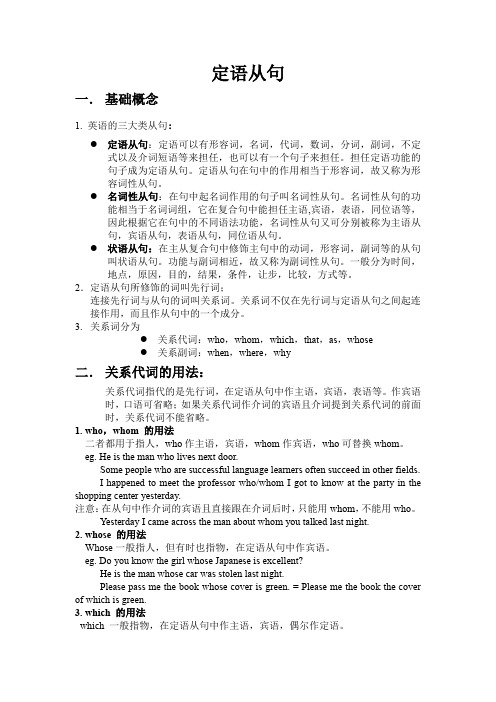
定语从句一.基础概念1. 英语的三大类从句:●定语从句:定语可以有形容词,名词,代词,数词,分词,副词,不定式以及介词短语等来担任,也可以有一个句子来担任。
担任定语功能的句子成为定语从句。
定语从句在句中的作用相当于形容词,故又称为形容词性从句。
●名词性从句:在句中起名词作用的句子叫名词性从句。
名词性从句的功能相当于名词词组,它在复合句中能担任主语,宾语,表语,同位语等,因此根据它在句中的不同语法功能,名词性从句又可分别被称为主语从句,宾语从句,表语从句,同位语从句。
●状语从句:在主从复合句中修饰主句中的动词,形容词,副词等的从句叫状语从句。
功能与副词相近,故又称为副词性从句。
一般分为时间,地点,原因,目的,结果,条件,让步,比较,方式等。
2.定语从句所修饰的词叫先行词;连接先行词与从句的词叫关系词。
关系词不仅在先行词与定语从句之间起连接作用,而且作从句中的一个成分。
3.关系词分为●关系代词:who,whom,which,that,as,whose●关系副词:when,where,why二.关系代词的用法:关系代词指代的是先行词,在定语从句中作主语,宾语,表语等。
作宾语时,口语可省略;如果关系代词作介词的宾语且介词提到关系代词的前面时,关系代词不能省略。
1. who,whom 的用法二者都用于指人,who作主语,宾语,whom作宾语,who可替换whom。
eg. He is the man who lives next door.Some people who are successful language learners often succeed in other fields.I happened to meet the professor who/whom I got to know at the party in the shopping center yesterday.注意:在从句中作介词的宾语且直接跟在介词后时,只能用whom,不能用who。
定语从句知识点高三
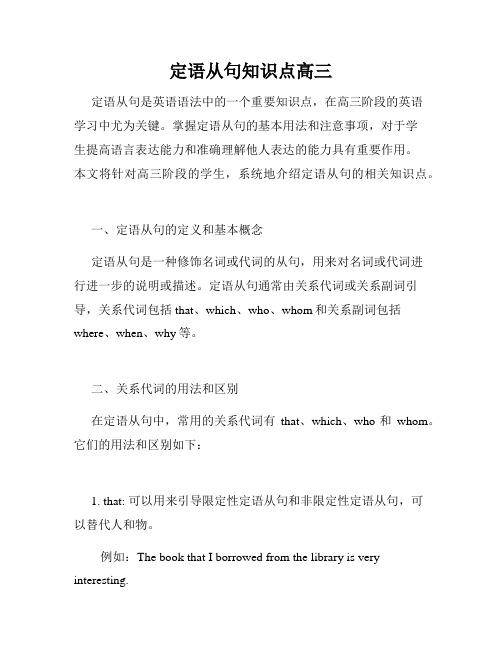
定语从句知识点高三定语从句是英语语法中的一个重要知识点,在高三阶段的英语学习中尤为关键。
掌握定语从句的基本用法和注意事项,对于学生提高语言表达能力和准确理解他人表达的能力具有重要作用。
本文将针对高三阶段的学生,系统地介绍定语从句的相关知识点。
一、定语从句的定义和基本概念定语从句是一种修饰名词或代词的从句,用来对名词或代词进行进一步的说明或描述。
定语从句通常由关系代词或关系副词引导,关系代词包括that、which、who、whom和关系副词包括where、when、why等。
二、关系代词的用法和区别在定语从句中,常用的关系代词有that、which、who和whom。
它们的用法和区别如下:1. that: 可以用来引导限定性定语从句和非限定性定语从句,可以替代人和物。
例如:The book that I borrowed from the library is very interesting.2. which: 可以用来引导非限定性定语从句,只能替代物,不能替代人。
例如:I bought a new car, which is very expensive.3. who: 只能用来引导限定性定语从句,只能替代人。
例如:The girl who is standing over there is my friend.4. whom: 只能用来引导限定性定语从句,只能替代人,作为宾语时常常被省略。
例如:The teacher whom we respect a lot is retiring.三、定语从句的引导词的省略在定语从句中,如果关系代词在从句中作动词的宾语并且从句中有自己的主语时,常常可以省略关系代词。
如果关系代词在从句中作介词的宾语,同样可以省略关系代词。
例如:1. I have a friend (who/that) I trust.(从句中有自己的主语)2. This is the book (which/that) I am looking for.(作介词的宾语)四、非限定性定语从句中的逗号非限定性定语从句用来对前面整个句子进行补充说明,它和主句之间应用逗号隔开。
- 1、下载文档前请自行甄别文档内容的完整性,平台不提供额外的编辑、内容补充、找答案等附加服务。
- 2、"仅部分预览"的文档,不可在线预览部分如存在完整性等问题,可反馈申请退款(可完整预览的文档不适用该条件!)。
- 3、如文档侵犯您的权益,请联系客服反馈,我们会尽快为您处理(人工客服工作时间:9:00-18:30)。
定语从句第一部分:基础知识(一).定语从句概述如果是一个句子担任定语,那么这个句子就叫做定语从句,又可称为形容词性从句。
定语从句通常修饰某一名词或代词,被定语从句修饰的这一名词或代词叫先行词。
定语从句的作用即在于对先行词进行限定说明或补充说明。
(二).定语从句的引导词定语从句的引导词分为两类关系代词(that, which, who, whom, whose )关系副词( when, where, why )引导词在先行词和定语从句之间,既起连接作用,即连接先行词和定语从句,更重要的是,它又在定语从句中作一个成分。
那么,关系代词和关系副词有什么区别呢?下面我们来具体讲解:(3).关系代词关系代词在从句中作主语、宾语、表语或定语1. that 指人,物eg: This is the photo (that I took in the country).He is the singer (that I met yesterday).2. which 指物eg: The expert offered us another piece of advice, which is of great help to our program.eg: Julie was good at German, French and Russian, all of ______ she spoke fluently.A. whichB.what c.that D.these如要选D,题目应该怎么改?3. who 指人,在从句中作主语,宾语。
whom 指人,在从句中作宾语;如先行词前有介词,则用whom而不用who。
eg: The lady (who /whom we met in the elevator this morning )is said to be the promoted.(作宾语即可用who也可用whom)That is the professor (who /whom you want to know).eg: The girl (at whom her classmates often laughed) was in fact very clever.5. whose 指人,物,相当于先行词+ ’s, 后接一名词;可等于the + 名词 + of。
eg: I know the boy (whose parents/the parents of whom are dead).I don’t like those cities (whose roads/the roads of which are dirty).whose用于从句主句成分完整,但主语残缺的情况:eg: Last week, we watched Beijing Opera, ______ style was unfamiliar to mos of us.A. whichB. whoseC. thatD. as选B。
先行词是Beijing Opera,带入到从句应该是Beijing Opera’s style was unfamiliar to mos of us.eg: She showed the visitors around the museum, ______ construction had taken more than 3 years.A. of whichB. whichC. whoseD.what如要选A,题目应该怎么改?【注】:关系代词在从句中作宾语时可以省略。
(四).关系副词关系副词在从句中作状语,有时相当于介词+which,其中which指代先行词,不可以指示整个句子。
1. when 指时间,在从句中作时间状语,相当于at/ on/ in/ during which. eg: I’ll never forget the day (when /on which I reached the top of the Huangshan Mountain).eg: Between the two parts of the concert is an interval, ______ the audience can buy ice-cream.A whenB whereC thatD which选A。
Interval意为间隔,休息时间。
是表示时间的名词,作先行词,它的含义在从句中作状语,即:the audience can buy ice-cream( in the interval).。
所以选择A when。
eg: I shall never forget those days _______ I lived in the city with the workers, ______has had a great effect on my life.A. which; thatB. which; whichC. when; whichD. when; who选C。
第一空用when引导定语从句,在句中作状语,先行词为those days;第二空用which引导非限制性定语从句,指代those days when I lived ... workers。
2. where 指地点,在从句中作地点状语,相当于at/ in / to/ which.eg: This is the school (where/at which I studied).eg: A man with a bleeding hand hurried in and asked, “Is there a hospital around ______ I can get some medicine for my wounded hand?”A. thatB. whichC. whereD. what选C。
句中的around 不是介词,而是副词,意为“在附近”;其后的where 引导定语从句用以修饰其前的地点名词 hospital,带入应该是句子应为:I can get some medicine in the hospital for my wounded hand.3. why 指原因,在从句中作原因状语,相当于for which.eg: That’s the real reason ______ he was late.That’s the reason ______ he gave for his being late.第二部分:关系代词的特殊用法(一)关系代词指物时, 用that而不用which的情况:1. 先行词为something ,anything ,nothing ,everything以及all , much , little ,a lot , none , few 等不定代词时。
eg: My mother was so proud of all that I did.2. 先行词有the last , the very , the only以及all , much , few , no , any ,little 等修饰时。
eg: This is the very book (that I’m looking for) .3. 先行词为序数词、形容词最高级(或所修饰)时。
eg: This is the most exciting film (that I’ve ever seen) .When people talk about Hangzhou , the first (that comes to their mind) is the West Lake .4. the same 修饰先行词时, 定语从句要用that 或as引导, 但意义不同。
This is the same watch as I lost last Sunday . (表示相同但并非同一) This is the same knife that I used yesterday . (表示就是那个)5. 先行词既有人又有物时, 只能用that。
eg: Do you remember the book and its author (that appeared on TV last Sunday).6. There be 后面的定语从句多用that引导 , 不用which 。
eg: There’s a seat in the corner (that is still free ).7.句子前面出现了who , which 时 , 后面的定语从句用that引导。
eg: They built a factory (which made some new products)( that had never been seen before ).Who is the man( that you were talking about just now) ?8. 关系代词在定语从句作表语时, 常用that , 而不用which 、who 。
eg: My home town is not the small village (that it was 10 years ago ).Tom isn’t the man (that he used to be).(二) 关系代词指人时, 有时只用who ,而不用that。
1. 先行词为指人的代词one , those , the man,以及人称代词如he等。
eg: Those (who are often late for school) should be punished .He (who doesn’t reach the Great Wall) is not a true man .2. 先行词为someone (somebody), no one (nobody), anyone (anybody),everyone (everybody) 。
eg: Anyone (who would like to attend the party) should come on time .3. 先行词指人时, 如有序数词, 最高级, the very , the only ,the last等修饰 ,定语从句既可用that也可用who引导。
eg: He is the first student (who / that worked out the problem) .(三) 关系代词whose的用法:1.whose 在从句中作定语,表示“先行词的…” ,既可指人,也可指物。
